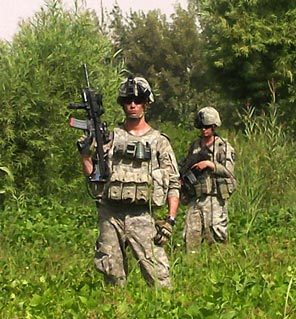With mental disorders among U.S. military personnel at an all-time high,

the Army is actively researching tools to combat depression and suicide. One of the many military-funded research projects is evaluating the feasibility of using a nasal spray to quickly relieve symptoms of depression and suicidal thoughts.
Colonel Carl Castro, head of the Military Operational Medicine Research Program, recently spoke to NBC News about the military’s search for evidence-based treatments for common mental disorders. Nearly $3 million has been funded by the Army for a three-year project to develop and test the anti-suicide nasal spray, with the goal of receiving FDA approval for both the medication and the nasal spray form of delivery.
The Armed Forces Health Surveillance Center reported in June 2012 that mental health illness among active duty troops have increased by 65 percent since 2000. In the post-9/11 military, depression, adjustment disorders, anxiety and alcohol abuse make up about 85 percent of mental health disorders. In July, 38 suspected suicides were reported among reserve and active-duty personnel. This is the highest monthly total since the military initiated a program to track suicides a few years ago.
The anti-suicide nasal spray project was awarded to Dr. Michael Kubek, a neurobiology instructor at Indiana University. Dr. Kubek helped discover TRH (Thyrotropin-Releasing Hormone), which has been shown to be effective for rapidly counteracting suicidal behavior and depression. Unfortunately, TRH is only useful in the short-term. The military hopes the spray can be used as a stop-gap emergency treatment between the time that a diagnosis of depression is first made and the three to six weeks that it takes for most anti-depressant drugs to make a real difference in a patient’s outlook. Once Dr. Kubek establishes that TRH can be delivered via nasal spray, researchers at Purdue University will assist with clinical trials.
The Army is spending $18 million for a dozen studies on suicide and depression. The investigation into the TRH nasal spray is the only study that involves a drug. Although suicide is among the top ten leading causes of death in the U.S., there are virtually no evidence-based standard treatments and most clinicians use a combination of therapy and medication. The Army hopes to find reliable tools that will help slow the suicide rate among soldiers. Once FDA approval is obtained, the TRH nasal spray could also be available for civilian use.
